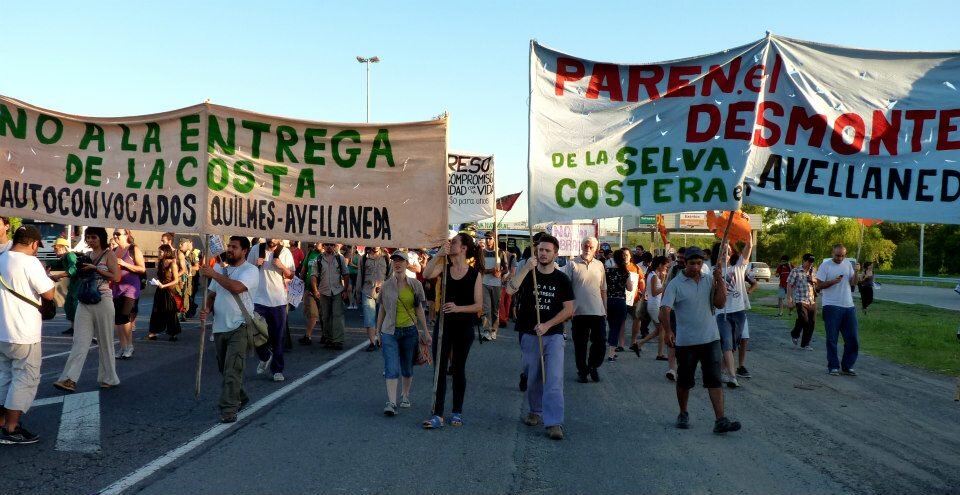the collective defence of an urban eco-system to minimise the impact of climate change
By Vanina P. Santy - 6th November 2019
What do the inhabitants of metropolitan areas in developing countries understand about climate change? What do they do to face its possible consequences? Responses to these questions are critical in coastal areas of southern Greater Buenos Aires, Argentina. It is here that people have begun to experience what climate change entails, as it is not in the future but is already affecting their lives. For some years now they have realized that what were once seasonal events, like east winds, have turned into severe storms and unprecedented flooding. In low areas of La Plata River the rapid change in weather patterns has dramatically manifested through an historical raise in water levels . The situation has also been the consequence of a previous transformation of natural areas -made up of native forests and wetlands- driven by market interests. Since the 1990s, urban planning had worked on a paradigm of public land destruction with the privatization and concession of such areas for real-estate projects. Human intervention had caused a hydrological change that reduced the capacity of low and flood areas to absorb rainfall.
The threat of destruction of those legally protected lands was realized with the announcement in 2008 of large-scale urbanization known as Nueva Costa del Plata. A luxury city would be built to replace an underdeveloped territory. The inhabitants self-organized in neighborhood assemblies and regional networks to question the ideals of progress promoted by local authorities and the multinational company behind the urbanization. Since then, a socio-environmental conflict remains open.
Image 1: The area under dispute. 29/9/2019. Author: Assembly Not to the Appropriation of the Coast Avellaneda and Quilmes.
Image 2: Illegal dumping in the natural reserve: one way of making land accessible to investors by inducing its physical deterioration. June 2016. Author: Vanina P. Santy
Image 3: Flooding at the riverside of Bernal. Posted on Facebook account Not to the Appropriation of the Coast Avellaneda-Quilmes on 5/2/2019.
To counter those territorial policies, people have also focused on the creation of environmental awareness among the general population, the public denunciation of governmental and corporate practices, and the restoration of riverside areas destroyed by deforestation. The latter emerged after the clearing of trees carried out by the company promoting the coastal urbanization in 2012. All of these initiatives set new ways of relating to the place from a perspective of resistance
Image 4: Educational activity organized by neighbors in July 2017 on the importance of wetlands and the environmental services they provide to the society. Additionally, on the role of society for their defence and protection. Posted on Facebook account Not to the Appropriation of the Coast Avellaneda-Quilmes on 6/7/2017.
Image 5: Devastation where there used to be a native forest. January 2012. Author: Assembly Not to the Appropriation of the Coast.
Image 6: The collective reconstruction of the place by putting back a tree where it was growing. July 2016. Author: Assembly Not to the Appropriation of the Coast.
Inhabitants have also organized popular protests in municipal and provincial government agencies and court buildings to question the change in land status that allows its appropriation by legal means.
Image 7: A protest on the highway Buenos Aires- La Plata in 2012 after the first deforestation in Wilde, district of Avellaneda.
Furthermore, they've worked together with over 70 families who inhabit the coast in order to promote the continuation of traditional practices such as carnivals. The objective was to spread the existence of a riverside identity that refuses to cease to exist.
Image 8: Carnival at the coast. February 2017. Author: Assembly Not to the Appropriation of the Coast.
The cleaning of the coast aimed to encourage others to believe that things can be done differently. It was a form of engendering social change.
Image 9: Cleaning day at the riverside of Bernal, district of Quilmes. 31/7/2019. Author: Assembly Not to the Appropriation of the Coast.
Neighbors' assemblies opposing Nueva Costa del Plata have held an idea of integration with nature that has acknowledged human responsibility on how nature is managed. This particular ecosystem is essential for urban life, it is a groundwater recharge space, it helps with flood control, it filters pollution, and houses biodiversity. Human beings are not outside nature then, they are part of it. Being prepared for climate change, they explain, will have to do with the reformulation of what human life is and how it can be protected for survival.
Image 10: Life is in our hands. “We work for the environment but we are for something deeper, it is life, if you do not have good water and you have no air, you die it is not that you are an environmentalist because you have nothing to do, it is about something more important, but it is something concrete, if you do not have this space you die” (A neighbor during an interview conducted on 3/1/2018. Photo taken on 25/9/2017 by Assembly people for the River Bernal.
Vanina Santy is a researcher in political ecology and a PhD candidate at the Center of Cultural Anthropology, Université libre de Bruxelles, Belgium. Her research focuses on the urban conflict brought about by the transformation of legally protected areas in the riverside of La Plata River, province of Buenos Aires. She has a Master's Degree in Social and Political Anthropology from the Latin American Faculty of Social Sciences (FLACSO). She worked for more than fifteen years in both the public and private sectors in Argentina as a communications specialist. She was an advisor to nonprofit organizations in Argentina in the field of institutional capacity building and management. She has published essays and articles in Latin America (CLACSO) and the United States (American Anthropologist).











